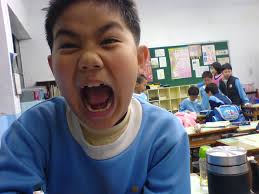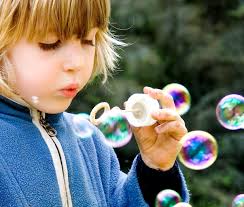Temperament Matters
The degree of intensity children have when responding to their environment is one of the ten factors that make up each person’s unique temperament. Children are born into this world with their own distinct blueprint for being. The factors that make up a person’s temperament are ones that will remain consistent throughout life.
By learning about and appreciating how your children uniquely respond to the world, you can empower yourself (and your children) with skills and attitudes that can help you prevent and positively manage any problems that may arise because of your children’s behavior styles.
What is Intensity?
Intensity refers to the amount of energy children commonly use to express emotions. Some children are born having very strong emotional reactions to things. Whatever they are feeling, these children use a lot of energy and excitement to convey it.
Others are born with reactions that are a lot less intense, seeming almost placid and showing little feeling. Many other children communicate emotions with intensities somewhere in-between the two.
Determine your children’s intensity
You can use the following questions to help you identify the level of intensity your children exhibit. Track your answers on the scale from one to five:
- Do your children seem to be explosive and loud rather than calm and quiet?
- Does it seem as if they express their emotions in extremes?
- Do they scream with excitement when good things happen?
- When confronted with something they do not like, for example a certain food, do they wail with frustration?
- Do you find yourself asking them constantly to quiet down?
No Yes
1 2 3 4 5
Low Intensity High Intensity
Mild Reactions Dramatic Reactions
Higher Intensity Children
 If the majority of your responses are “yes” and fall at the right side of the scale, then you have children who are highly intense. This means that your children have a tendency to respond loudly and vigorously to the world around them.
If the majority of your responses are “yes” and fall at the right side of the scale, then you have children who are highly intense. This means that your children have a tendency to respond loudly and vigorously to the world around them.
Whether angry, sad or happy, they feel emotions very deeply and passionately, and because of this, they are more likely to get their needs met quickly. Intense children often do not understand their level of response to things.
For example, you can quickly find them melting down with frustration if they don’t get something that they expected to get. Conversely, you can find them shouting with glee when they do get something that they wanted.
Because of these extreme expressions of emotions, intense children can sometimes be frustrating and challenging to parent. These children need your help to identify when their intensity is building.
- Give them words to use to help them express how they are feeling.
- Assist them in finding ways to calm down and to channel their feelings into productive and creative outlets.
- When emotions run too high, give them time and space to help them regain their composure and tone down their reactions.
- If this happens in a public place, respectfully acknowledge what they are feeling, “You have a lot of energy right now. It looks like we need to take a break for a few minutes.” Then follow through by taking them out of the situation.
It is not always easy to parent intense children.
Sometimes it takes a lot of patience and practice on your part to remain calm and empathic.
Keep in mind the positive aspects of your intense children.
For example, your intense child may experience the world in a much richer and deeper way than others. This view can help you appreciate their uniqueness. They can be outgoing, demonstrative, dramatic, and can often do well in careers in sales or the performing arts.
Lower Intensity Children
 If, on the other hand, most of your answers to the questions above are “no” and fall toward the left side of the scale, your children tend to be less intense and their reactions to the world are probably very mild.
If, on the other hand, most of your answers to the questions above are “no” and fall toward the left side of the scale, your children tend to be less intense and their reactions to the world are probably very mild.
These children seem to whimper or whine quietly when upset and smile slightly and briefly when happy or excited.
Sometimes it is hard to judge how they are feeling because they do not express their emotions very strongly. Their reactions to things can even be misinterpreted.
For example, when given gifts they often do not show a lot of excitement but instead may quietly say thank you. This does not mean that they are unappreciative; it merely means they have a low intensity for showing emotions.
Children who are less intense need you to understand and appreciate that their less-than-enthusiastic expressions are not being done purposefully, and that they deserve your attention as much as their more intense, vocal, and dramatic siblings.
Just because children express things with less intensity does not make what they have to say less important. Learning to appreciate that can help your children to feel better.
You can help your children:
- by teaching them to express more accurately how they are feeling
- by giving them words to use and letting them practice saying them using more forceful emotions and tones
- by teaching them how to accept gifts so that feelings are not hurt
- by showing them how to be more assertive when they are upset
Things Parents Can Do
- Understand that intensity is part of your children’s in-born temperament.
- Avoid negatively labeling your children’s strong intensity levels.
Instead of calling your children “aggressive,” “mean,” or “wild,” use descriptive, more positive words like “zestful,” “energetic” and “with vigor.” - Acknowledge your children’s temperament.
Help them to understand their own temperamentally-driven behavior. - Teach children the words to use to express how they are feeling.
With a broader vocabuary, they can more accurately and appropriately let people know how they are feeling. - Teach children self-help skills.
For example, teach them how to calm down when their intensity level starts rising or how to express themselves more vigorously if their intensity is low. - Help children find acceptable outlets for their intense feelings.
- Work on understanding and managing your own intensity.
- Learn to work together.
Understand how your temperament fits or does not fit with your children’s temperament and create strategies to help each other. - Send messages that help your children feel good about who they are:
“You get the most out of life.”
“You like to do everything with great zest and enthusiasm.”
“You have very strong reactions to things and express your feelings strongly.”
“You make it very clear how you are feeling.”
“There are things you can do to help yourself calm down.”
“You can learn to let others know how you feel.”
“You can be quiet and calm and still be strong and get what you need.”
____________________________________________________________
For more information about temperament, check out the following books. Purchasing from Amazon.com through our website supports the work we do to help parents do the best job they can to raise their children.
<recommended books about temperament
<all our recommended parenting books
____________________________________________________________




